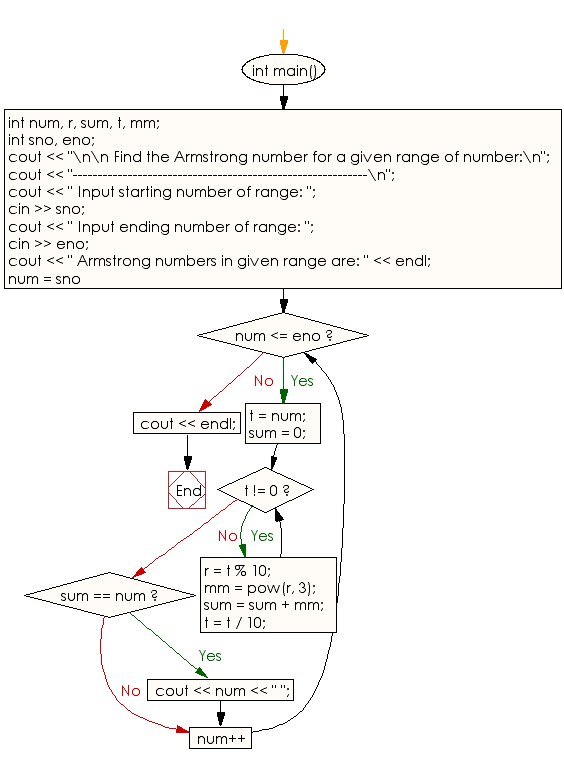C++ Exercises: Find the Armstrong number for a given range of number
44. Find Armstrong Numbers in a Given Range
Write a C++ program to find the Armstrong number for a given range of numbers.
/*When the sum of the cube of the individual digits of a number
is equal to that number, the number is called Armstrong number. For example 153.
Sum of its divisor is 13 + 53;+ 33; = 1+125+27 = 153*/
Sample Solution:
C++ Code:
#include <iostream>
#include <math.h>
using namespace std;
int main()
{
// Initialize variables
int num, r, sum, t, mm;
int sno, eno;
// Display instructions to the user
cout << "\n\n Find the Armstrong number for a given range of number:\n";
cout << "-----------------------------------------------------------\n";
// Input starting and ending numbers for the range
cout << " Input starting number of range: ";
cin >> sno;
cout << " Input ending number of range: ";
cin >> eno;
// Display a message for Armstrong numbers found in the range
cout << " Armstrong numbers in given range are: " << endl;
// Loop through the range of numbers to find Armstrong numbers
for (num = sno; num <= eno; num++)
{
t = num; // Store the current number in a temporary variable
sum = 0; // Initialize the sum variable to zero
// Calculate the sum of cubes of digits in the number
while (t != 0)
{
r = t % 10; // Extract the last digit
mm = pow(r, 3); // Calculate the cube of the digit
sum = sum + mm; // Add the cube to the sum
t = t / 10; // Remove the last digit
}
// Check if the sum of cubes of digits equals the original number
if (sum == num)
cout << num << " "; // Print the Armstrong number found
}
cout << endl;
}
Sample Output:
Find the Armstrong number for a given range of number: ----------------------------------------------------------- Input starting number of range: 25 Input ending number of range: 200 Armstrong numbers in given range are: 153
Flowchart:

For more Practice: Solve these Related Problems:
- Write a C++ program to list all Armstrong numbers within a specified range using iterative digit processing.
- Write a C++ program to generate Armstrong numbers in a range by leveraging vector storage and STL algorithms.
- Write a C++ program to compute Armstrong numbers between two limits with optimized power functions for each digit.
- Write a C++ program to display Armstrong numbers in a range along with their corresponding digit power sums.
Go to:
PREV : Armstrong Number Check.
NEXT : Strong Number Check .
C++ Code Editor:
Contribute your code and comments through Disqus.
What is the difficulty level of this exercise?
